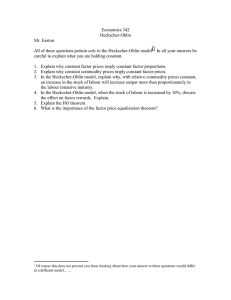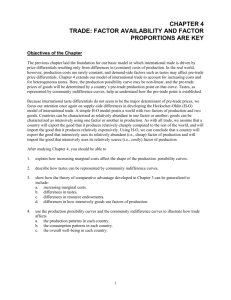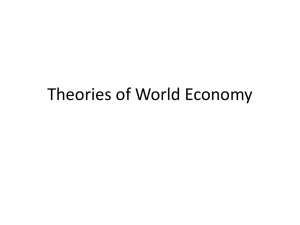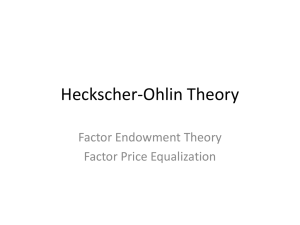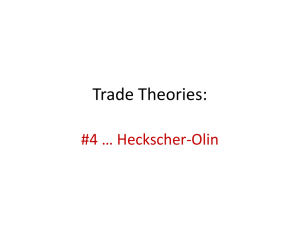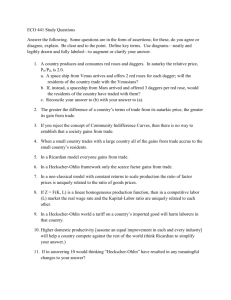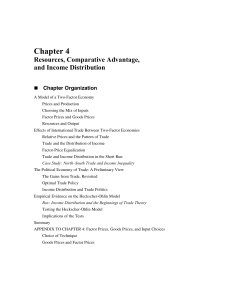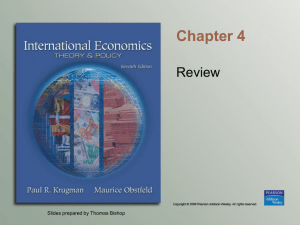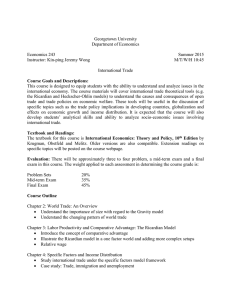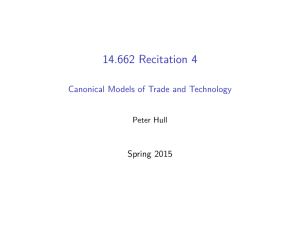The Heckscher-Ohlin theorem
advertisement
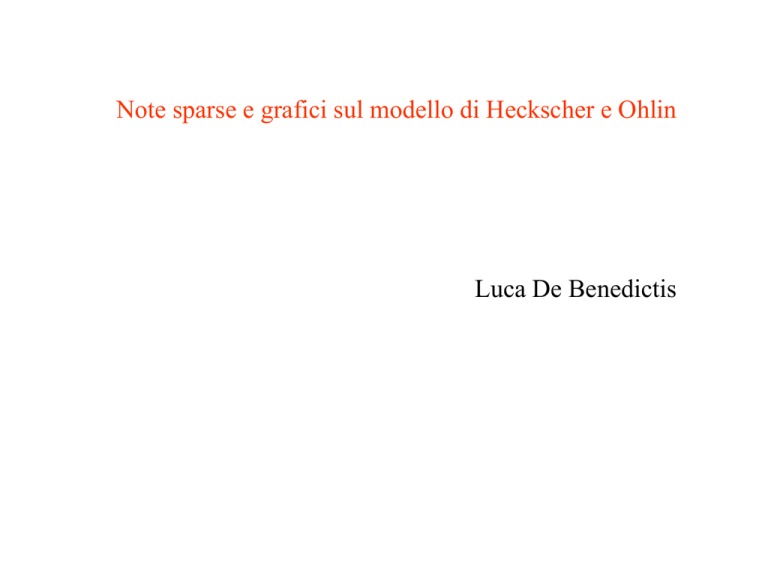
Note sparse e grafici sul modello di Heckscher e Ohlin Luca De Benedictis Factor endowments Physical definition K K L Home L Foreign Factor price definition w w r Home r Foreign Home is relatively capital-abundant (= labor-scarce) Foreign is relatively labor-abundant (= capital-scarce) Factor intensities K K L Y L X Good Y relatively capital-intensive Good X is relatively labor-intensive Endowments and production possibilities K kH L H K Y kF YH EH In autarky, the relative price of the labor-intensive good (X) is lower in the laborabundant country (Foreign). p A H YF EF YH YF p A F XF XH Note: Here Y is more capitalintensive at all factor price ratios. L X XH XF International equilibrium in the Heckscher-Ohlin model Y p YH p A H YF 0 p* ExHome D C AF AH p* p A F =C=D ExForeign ( XC X P ) X XH XF Trade in the Heckscher-Ohlin model • The Heckscher-Ohlin theorem: A country will export the commodity that intensively uses its relatively abundant factor. • The relatively labor-abundant country exports labor services embodied in goods and imports capital services embodied in goods Trade and factor prices in the Heckscher-Ohlin model Indirect exports of a factor supply of the factor in the domestic market domestic price of the factor Indirect imports of a factor supply of the factor in the domestic market domestic price of the factor Trade tends to make factor prices more similar between trading countries Product prices and factor prices in the H-O model Y LY OY KX A pA B B pB X B A' A OX A LX KY Unit value isoquants and isocosts K in the H-O model p X X $1 wLX rK X kY k H $1 r pY Y $1 wLY rKY Y$1 kX X $1 $1 w wL rK $1 L Some stylized facts about economic trends since 1975 • Physical and political barriers to trade have been significantly reduced in many countries • Real wages (for unskilled labor) have remained constant or even fallen in the North increased income inequalities there. • Real wages have increased for large groups of workers in the South (but not for all and large variations between countries). K Factor price equalization kY Y$1Fa Y$1Ha kX X $1Fa X $1Ha Ha * Fa L K Limits to factor price equalization kY kH kX H kF ' F L How will a change in product prices affect factor prices? Y LY OY KX A pA B B pB X p kX B A' A OX and kY A LX KY Another look at how a change in product prices affects factor prices K kYB kYA Y$1B k XB Y$1 A k XA X $1 A B X $1 B A L How will a change in product prices affect real wages? w p MPL w MPLX pX f K , L w MPLY pY r p MPK r MPKX pX r MPKY pY B f K, L A slope = MPK K The Stolper-Samuelson theorem If there are constant returns to scale and both goods continue to be produced, a relative increase in the price of a good will increase the real return to the factor used intensively in that industry and reduce the real return to the other factor. In our example: • there was a relative increase in the price of good X • labor is used intensively in that sector • in both sectors, the capital-intensity of production was raised after the price change w MPLX pX w MPLY pY and r MPKX pX r MPKY pY The effect of changes in factor endowments on output Assume constant relative prices of goods KX OY ' OY LY Q' Q kX kY kY OX LX KY KY ' The Rybczynski theorem If relative commodity prices are constant and if both commodities continue to be produced, an increase in the supply of a factor will lead to an increase in the output of the commodity using that factor intensively and a decrease in the output of the other commodity. In our example: • there was an increase in the supply of labor • labor is used intensively in the production of good X X and Y
